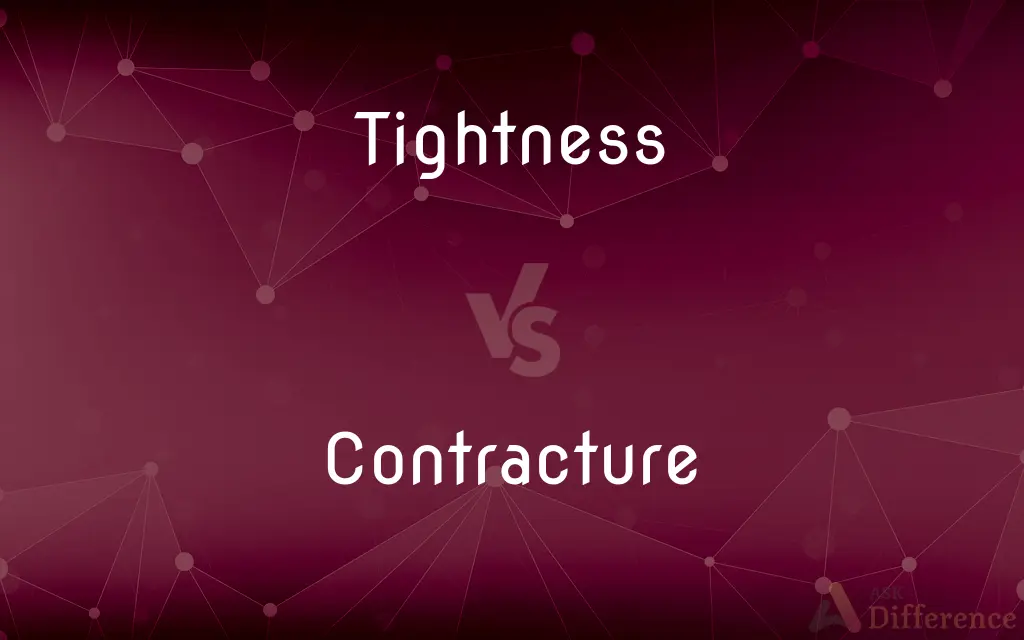Tightness vs. Contracture — What's the Difference?
By Tayyaba Rehman — Updated on November 3, 2023
Tightness is a sensation or state of being firm or rigid; contracture is a permanent tightening of muscles, tendons, or skin.

Difference Between Tightness and Contracture
Table of Contents
ADVERTISEMENT
Key Differences
Tightness is often a temporary state, describing the feeling of muscles being tense or a space that is closely fitted. In contrast, a contracture refers to a medical condition where muscles or tendons shorten, causing a permanent loss of motion in the affected joints. Tightness can occur due to a variety of everyday activities or stress, whereas contractures often result from underlying health conditions.
Muscle tightness can be relieved through stretching, massage, or rest, indicating its reversible nature. However, contractures are typically resistant to such simple interventions and may require physical therapy, splinting, or even surgery for improvement. While tightness is a common experience, contractures are specific pathological states that significantly impact an individual’s mobility and quality of life.
Tightness can be subjective, felt by an individual without visible signs. On the other hand, a contracture can often be observed as a physical deformity or abnormal joint position. For example, someone might describe feeling tightness in their back, but a contracture could manifest as a bent elbow that cannot be straightened.
In the context of materials, tightness refers to the property of being fixed or secured closely. Contractures do not occur in inanimate objects but are solely a biological condition affecting living tissues. Therefore, tightness can apply to both living and non-living contexts, while contracture is used exclusively in the medical field.
While anyone can experience tightness, contractures are more likely in populations with neurological or muscular disorders, those who have sustained injuries, or the elderly. Understanding the difference is essential because tightness is generally benign and temporary, whereas contractures represent a serious condition requiring medical attention.
ADVERTISEMENT
Comparison Chart
Definition
State of being firm or stiff
Permanent shortening of muscle or tissue
Reversibility
Often temporary and reversible
Typically irreversible without medical treatment
Occurrence
Can occur in muscles or materials
Occurs in muscles, tendons, or skin
Relief
Can be relieved with stretching or rest
May require therapy or surgery
Context
Common in everyday language and experience
Medical term used in health contexts
Compare with Definitions
Tightness
Affording little spare time; full
A tight schedule.
Contracture
In medicine, a contracture may result from prolonged immobility
Bedridden patients sometimes develop contractures.
Tightness
Tightness is the feeling of muscles being constricted
She felt tightness in her shoulders after working at the computer all day.
Contracture
A contracture is a permanent tightening of tissue which decreases mobility
After the stroke, he developed a contracture in his arm.
Tightness
Tightness can describe restricted movement
The tightness in the jar's lid made it hard to open.
Contracture
Contracture can occur when skin heals and restricts movement
The burn scars led to a contracture that limited her hand's motion.
Tightness
In finance, tightness indicates a closely contested market
The tightness of the market led to increased prices.
Contracture
Contracture can be a complication of a neuromuscular disease
Muscular dystrophy can lead to severe contractures over time.
Tightness
Tightness can refer to a space that is narrowly confined
The tightness of the room made him feel claustrophobic.
Contracture
In pathology, a contracture is a permanent shortening of a muscle or joint. It is usually in response to prolonged hypertonic spasticity in a concentrated muscle area, such as is seen in the tightest muscles of people with conditions like spastic cerebral palsy, but can also be due to congenital abnormal development of muscles and connective tissue in the womb.
Tightness
In clothing, tightness means fitting closely to the body
The tightness of the dress accentuated her figure.
Contracture
Joint contractures are deformities that can be congenital or acquired
She was born with a contracture that affected her foot's shape.
Tightness
Fixed or fastened firmly in place
A tight lid.
Tight screws.
A tight knot.
Contracture
An abnormal, often permanent shortening, as of muscle or scar tissue, that results in distortion or deformity, especially of a joint of the body.
Tightness
Stretched or drawn out fully
A tight wire.
A tight drumhead.
Contracture
A deformity resulting from a contracture.
Tightness
Of such close construction as to be impermeable
Cloth tight enough to hold water.
Warm in our tight little cabin.
Contracture
(medicine) An abnormal, sometimes permanent, contraction of a muscle or skin; a deformity so caused.
Tightness
Leaving little empty space through compression; compact
A tight suitcase.
A tight weave.
Contracture
A state of permanent rigidity or contraction of the muscles, generally of the flexor muscles.
Tightness
Closely reasoned or concise
A tight argument.
A tight style of writing.
Contracture
An abnormal and usually permanent contraction of a muscle
Tightness
Fitting close or too close to the skin; snug
A tight collar.
A fit that was much too tight.
Tightness
(Slang) Personally close; intimate
"me and the D.A., who happen to be very tight with one another" (Tom Wolfe).
Tightness
Experiencing a feeling of constriction
A tight feeling in the chest.
Tightness
Reluctant to spend or give; stingy.
Tightness
Obtainable with difficulty or only at a high price
Tight money.
Tightness
Affected by scarcity
A tight market.
Tightness
Difficult to deal with or get out of
A tight spot.
Tightness
Barely profitable
A tight bargain.
Tightness
Closely contested; close
A tight match.
Tightness
Chiefly British Neat and trim in appearance or arrangement.
Tightness
Marked by full control over elements or subordinates; firm
Tight management.
A tight orchestral performance.
Tightness
(Slang) Intoxicated; drunk.
Tightness
(Baseball) Inside.
Tightness
Firmly; securely.
Tightness
Soundly
Sleep tight.
Tightness
Snugly or with constriction
My shoes are laced too tight.
Tightness
The quality or degree of being tight
Tightness
The quality or condition of being tight.
Tightness
A state occasioned by scarcity of money and a shortage of credit
Tightness
Extreme stinginess
Tightness
Lack of movement or room for movement
Common Curiosities
What causes muscle tightness?
Muscle tightness can be caused by overuse, stress, or muscle strain.
How is a contracture diagnosed?
Contractures are diagnosed through physical exams and sometimes imaging tests.
Can tightness lead to contracture?
If not properly addressed, chronic tightness can contribute to the development of a contracture.
Is tightness a symptom of a serious condition?
While often benign, persistent tightness could indicate an underlying health issue.
Does massage help with tightness or contractures?
Massage can help relieve tightness but may not be effective for contractures without other treatments.
Is heat therapy useful for tightness or contractures?
Heat can help alleviate tightness but isn't a standalone treatment for contractures.
How are contractures treated?
Treatment may include physical therapy, surgery, or use of splints and braces.
Can children get contractures?
Yes, children can develop contractures, often due to congenital conditions or lack of movement.
Are there exercises to prevent tightness?
Yes, regular stretching and mobility exercises can help prevent tightness.
Are there medications for contractures?
Medications may be used to manage symptoms, but they do not cure contractures.
Can contractures be prevented?
Contractures can sometimes be prevented with early intervention and physical therapy.
What is a flexion contracture?
A flexion contracture is a bend at a joint caused by tissue shortening.
Does tightness always cause pain?
Tightness can be uncomfortable but does not always result in pain.
Can tightness affect joints?
Yes, tightness can lead to joint stiffness and discomfort.
Can tightness be a sign of dehydration?
Yes, dehydration can contribute to muscle tightness.
Share Your Discovery

Previous Comparison
Bumfluff vs. Beard
Next Comparison
Endurance vs. PerseveranceAuthor Spotlight
Written by
Tayyaba RehmanTayyaba Rehman is a distinguished writer, currently serving as a primary contributor to askdifference.com. As a researcher in semantics and etymology, Tayyaba's passion for the complexity of languages and their distinctions has found a perfect home on the platform. Tayyaba delves into the intricacies of language, distinguishing between commonly confused words and phrases, thereby providing clarity for readers worldwide.














































